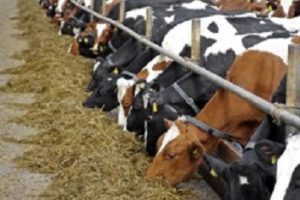Thirty-three environmental and public advocacy groups from around the country have presented EPA Administrator Scott Pruitt with a petition requesting that the Agency thoroughly revise its national concentrated animal feeding operation (CAFO) regulations to ensure that pollution from CAFOs does not impair water quality.

CAFOs are large-scale, industrial factory farms. Most livestock in the United States are raised in these operations, which confine hundreds of thousands of animals and their waste. Vast quantities of manure generated at CAFOs are typically disposed of on cropland.
Agricultural Stormwater Exemption
The petitioners, which include the Center for Biological Diversity, the Environmental Integrity Project, and local organizations, are mainly concerned with regulations the Agency issued in 2003 and amended in 2008.
“The current regulations fail to require water monitoring, do not prohibit practices known to harm water quality, generally ignore numerous pollutants of concern, place critical decisions about waste management in the hands of state agencies, and exempt most chronic CAFO discharges from permit requirements through an unreasonably broad reading of the agricultural stormwater exemption,” state the petitioners. “In short, the existing regulations are far too weak, and do not apply to enough of the industry, to protect water quality.”
It appears that the agricultural stormwater exemption is at the top of the list of concerns.
“Despite the fact that the environmental impacts from land application of manure are well known, EPA has adopted an overly broad reading of the agricultural stormwater exemption that has tied its hands from regulating much of this CAFO pollution,” state the petitioners. “This reading, which defines precipitation-related discharges of manure as non-point source pollution when land-applied in accordance with an NMP [nutrient management practice] , rather than as point source pollution subject to the NPDES [National Pollutant Discharge Elimination System] program, is contrary to the language and purpose of the CWA [Clean Water Act]. Moreover, it virtually guarantees that there will be unregulated runoff of CAFO pollution to waterways—the very concern that prompted Congress to regulate CAFOs as point sources in the first place.”
Unpermitted
The petitioners are also concerned that most CAFOs are not required to obtain NPDES permits.
“The current rules inexplicably allow large CAFOs to land apply without NPDES permits, in effect assuming that these CAFOs’ NMPs are even better and will result in zero dry weather discharge,” state the petitioners. “This inherently contradictory scheme fails to protect waterways and has led to far less permitting than the CWA requires. The evidence clearly supports—and in fact dictates—a determination that all CAFOs that land apply waste discharge and require NPDES permits.”
The petition notes that many states that operate the NPDES program have been lax in issuing permits. For example, Iowa “has refused to issue a single permit to any of its thousands of confinement operations, despite hundreds of documented discharges,” say the petitioners
Currently, about 40 percent of CAFOs nationwide have NPDES permits.
Request for Relief
The petition asks that the EPA undertake the following actions:
- Establish an evidentiary presumption that certain CAFOs discharge and are either subject to NPDES permitting or must rebut the presumption by demonstrating they do not discharge.
- Revise its interpretation of the agricultural stormwater exemption such that no discharges resulting from CAFO activities are exempt as non-point source pollution.
- Ensure that integrators who meet the CWA definition of owner or operator are copermitted with contract producers, as the statute has always required.
- Revise certain definitions in the CAFO regulations.
- Revise the requirements applicable to all CAFOs, including by requiring water quality monitoring in CAFO NPDES permits to ensure compliance with the CWA and permit terms.
- Revise the CAFO effluent limitation guidelines (ELGs) to address additional CAFO pollutants of concern, prohibit practices known to harm water quality, and otherwise strengthen existing requirements.
The petition is here.
